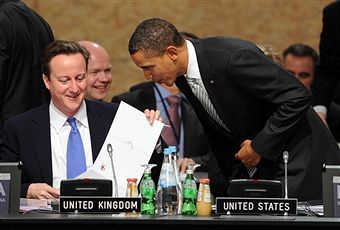 David Cameron has a good relationship with Barack Obama, which will be on display when
the US president visits Britain shortly. They speak regularly and frankly and their senior advisers are in near-constant contact. The idea that the Lib Dems would foist a more “Love
Actually” policy onto the coalition has come to naught.
David Cameron has a good relationship with Barack Obama, which will be on display when
the US president visits Britain shortly. They speak regularly and frankly and their senior advisers are in near-constant contact. The idea that the Lib Dems would foist a more “Love
Actually” policy onto the coalition has come to naught.
Yet Britain’s influence in Washington has waned. This is no fault of the Prime Minister. In fact, his personal diplomacy has probably slowed-down the process. Instead it has to do with structural changes in the US: the coming to power of a “pacific” President, the importance of US-China ties, the emergence of the Tea Party. As the US begins to cut its defence budget and uses the killing of Osama Bin Laden to reconsider its overseas posture, there is a real risk that US-British links, and indeed US-NATO ties, will grow weaker.
This will be a huge problem. Britain needs an active and engaged America. An America that cares about the West and is not inward-looking, imprisoned by the neo-Jacksonian urges of the Tea Party. To stem the tide, William Hague needs to develop schemes to address the risk of a neo-isolationist turn in the US. The assistance of partners such as France, Germany and Australia will be vital to this. The West needs a joint project, much as it found renewed purpose over the collaboration over NATO’s eastern enlargement. And Britain, indeed all of NATO, needs to become a greater part of the US foreign policy debate.
One idea could be setting up a Major/Blair Foundation, with the two ex-leaders as patrons for an outfit based in Washington to try to influence US debates from a European perspective. A prominent leader should be appointed to run the foundation – someone like Lord Guthrie, Paddy Ashdown, Peter Mandelson or Tom King. Or an intellectual like Niall Fergusson. And just as the US has a visitor’s programme used to target upcoming British politicians, the FCO should operate something similar in the States.
In terms of policy, one of the greatest challenges that the US and Britain face is to aid the transformation of the Middle East. Specifically, how to help democratic consolidation in the region? NATO and EU membership is out of the question for North Africa states, so the US and Europe might develop “Atlantic-Mediterranean Accords” – a kind of association like NATO’s Partnership for Peace, where the US and European governments offer Tunisia and Egypt trade access and reform assistance in exchange for democratic reforms.
Britain needs an engaged US and the Foreign Secretary should focus the FCO’s attention on how to keep its closest partner interested in the West. Not just rhetorically, but genuinely.






Comments